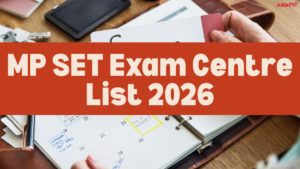Table of Contents
The Haryana Teacher Eligibility Test (HTET) is a crucial milestone for candidates looking to secure a teaching position in Haryana’s government schools. The days leading up to the exam, which is scheduled for 30 and 31 July 202,5 are often filled with tension, high expectations, and pressure to revise everything. But in the rush to cover it all, many aspirants end up making avoidable mistakes that hurt their performance in the actual exam.
Whether you’re appearing for PRT, TGT, or PGT, the final week is about smart revision, not mindless cramming. To help you navigate this phase better, here’s a breakdown of the top 10 mistakes HTET aspirants make during the last week and what you should do instead.
Top 10 Mistakes HTET Aspirants Make in the Last Week
The final stretch before the HTET exam is critical. Avoiding these last-week mistakes isn’t just about damage control; it’s about building confidence, using your time effectively, and showing up on exam day fully prepared. A focused and error-free final week helps you retain more, stay calm, and boost your chances of qualifying. Let’s break down what you shouldn’t do, so you can focus on what truly matters.
1. Ignoring the Exam Pattern and Subject Weightage
Many candidates overlook the importance of reviewing the latest HTET exam pattern. This often leads to spending too much time on low-weightage topics while missing out on scoring areas. Before you dive into revision, understand the marks distribution and question structure for your paper level.
2. Starting New Topics from Scratch
Trying to learn a completely new topic in the final week is a recipe for confusion. It adds unnecessary stress and distracts from topics you’re already comfortable with. Stick to revision and aim to strengthen your existing knowledge base.
3. Skipping Full-Length Mock Tests
Not attempting mock tests is a major setback in the last leg of preparation. Mock exams train you to manage time, build exam temperament, and highlight your weak points. One mock test a day, followed by detailed analysis, can significantly boost your confidence and speed.
4. Avoiding Previous Year Question Papers
Previous year papers are often the closest you’ll get to the real exam. Many aspirants ignore these due to time constraints or overconfidence. Practising them gives insight into question trends and difficulty levels and helps you align your preparation with the exam’s demands.
5. Over-relying on Short Notes and Cheat Sheets
While notes are helpful for quick revision, relying solely on them might lead to a shallow understanding. Especially for subjects like Child Development & Pedagogy, conceptual clarity is key. Use notes as a summary tool, not your primary source of study.
6. Skipping a Structured Revision Plan
Random revision doesn’t work. Without a plan, you end up revising familiar topics repeatedly while neglecting weaker areas. Create a simple, subject-wise revision timetable for the final week, and stick to it. That way, you cover everything without panic.
7. Ignoring Sleep, Food, and Breaks
Studying non-stop may sound productive, but it often backfires. Lack of sleep, unhealthy meals, and no breaks can lead to burnout. A calm, rested mind performs far better. Aim for 7–8 hours of sleep, hydrate well, and eat light meals that keep you focused.
8. Not Reading Admit Card Instructions Properly
A surprising number of candidates face issues on exam day due to simple oversights, like carrying the wrong ID or arriving late. Go through your HTET admit card carefully. Know your centre location, reporting time, and the list of allowed and restricted items.
9. Falling for Last-Minute Social Media Advice
From “secret tricks” to “100% sure-shot questions,” social media is flooded with last-minute tips. Most of these are unverified or clickbait. Avoid switching strategies now. Trust your preparation and focus on reliable resources.
10. Letting Panic and Self-Doubt Take Over
With just days left, it’s normal to feel nervous. But letting doubt creep in can destroy your confidence. Avoid comparing yourself with others or thinking about the outcome. Focus on what’s in your control: revision, mindset, and rest.
How to Avoid Mistakes In Last Week of HTET Prepation?
1. Review the Exam Pattern Thoroughly
- Go through the official HTET syllabus and structure again.
- Make a chart of section-wise marks and question count.
- Focus more on high-weightage subjects like Pedagogy and Language I/II.
2. Avoid New Topics Entirely
- Stick to what you’ve already studied.
- Allocate time to revise familiar but important areas.
- If you encounter a new topic, read summaries—not full chapters.
3. Attempt One Full Mock Test Daily
- Take one mock test every day at the same time as your actual exam.
- Simulate real exam conditions to build speed and accuracy.
- Review your performance post-test and note down common errors.
4. Solve 2-3 Previous Year Papers
- Pick recent HTET question papers for your level (PRT/TGT/PGT).
- Focus on pattern, phrasing, and commonly repeated topics.
- Practice with a timer and track accuracy.
5. Use Notes Strategically, Not Exclusively
- Use short notes for last-minute brushing up.
- For confusing or conceptual topics, revisit core study material.
- Revise from handwritten notes instead of making new ones now.
6. Follow a Daily Subject-Wise Revision Plan
- Divide your day into subject-focused slots (e.g., Pedagogy, Hindi, Reasoning).
- Prioritize weaker topics early in the week and strengths near the exam day.
- Stick to fixed revision windows (avoid open-ended study sessions).
7. Take Care of Your Body and Mind
- Sleep for 7–8 hours, preferably at night.
- Stay hydrated and eat nutritious food like fruits, nuts, and light meals.
- Include 15–20 minutes of light physical activity or meditation.
8. Read Admit Card and Guidelines Twice
- Download and print your admit card in advance.
- Double-check your ID proof, reporting time, and prohibited items.
- Visit your exam centre a day early if it’s in another city.
9. Limit Social Media and Random Advice
- Unfollow or mute groups and pages that create confusion or panic.
- Rely on trusted platforms like HTET official site or verified educator channels.
- Follow your own plan instead of experimenting at the last moment.
10. Practice Positive Self-Talk and Mindfulness
- Remind yourself daily: “I’m prepared, and I can do this.”
- Avoid discussing the exam with negative or anxious peers.
- Use deep breathing, journaling, or light music to calm pre-exam nerves.




 REET Mains Question Paper 2026, Download...
REET Mains Question Paper 2026, Download...
 CSIR NET JRF Success Story: How Siddhart...
CSIR NET JRF Success Story: How Siddhart...
 MP SET Exam Centre List 2026, District W...
MP SET Exam Centre List 2026, District W...













